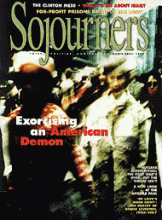Racism is more than an expression of an individual attitude; it is prejudice with power behind it. But looked upon with a biblical and theological eye, white racism may be recognized to be even morean active and aggressive principality, a "power" that appears to move, adapt, and grow with a life of its own.
In 1963, William Stringfellow made precisely this point in a brief speech at the first National Conference on Religion and Race in Chicago. Addressed by Martin King, Sargeant Shriver, and Abraham Heschel, the conference, both ecumenical and interfaith, was the first major foray of the mainline denominations into the freedom struggle. Stringfellow's remarks were controversial for a variety of reasons, including his excoriation that the gathering was "too little, too late, and too lily white." However, his most provocative and remarkable observation was this:
From the point of view of either biblical religion, the monstrous American heresy is in thinking that the whole drama of history takes place between God and humanity. But the truth, biblically and theologically and empirically, is quite otherwise: The drama of this history takes place amongst God and humanity and the principalities and powers, the great institutions and ideologies active in the world. It is the corruption and shallowness of humanism which beguiles Jew or Christian into believing that human beings are masters of institution or ideology. Or to put it differently, racism is not an evil in human hearts or minds; racism is a principality, a demonic power, a representative image, an embodiment of death, over which human beings have little or no control, but which works its awful influence in their lives.
Read the Full Article

